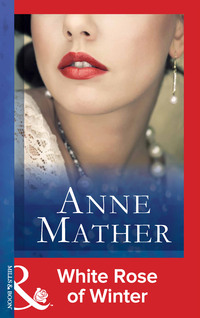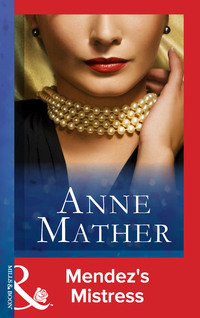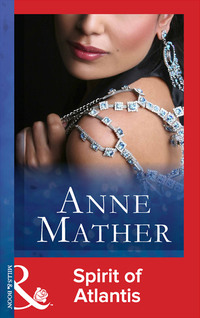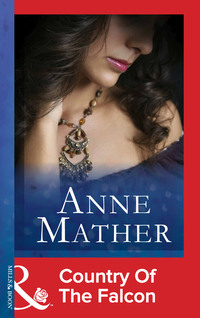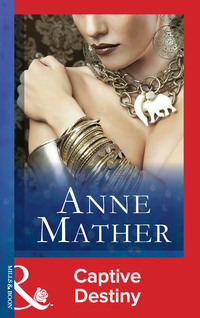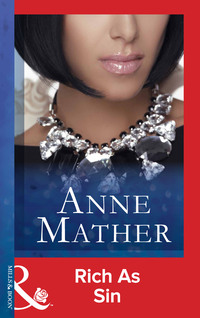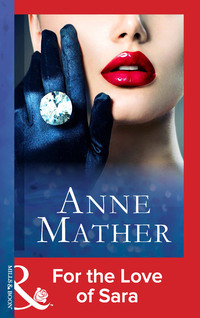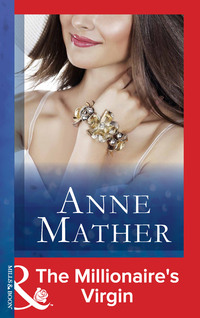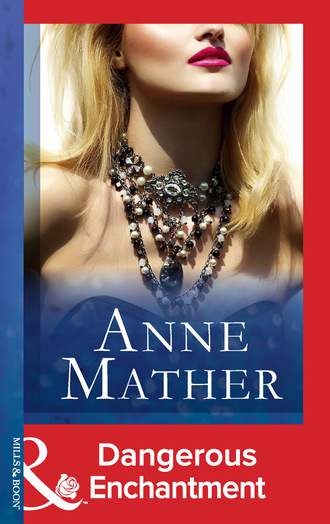
Полная версия
Dangerous Enchantment

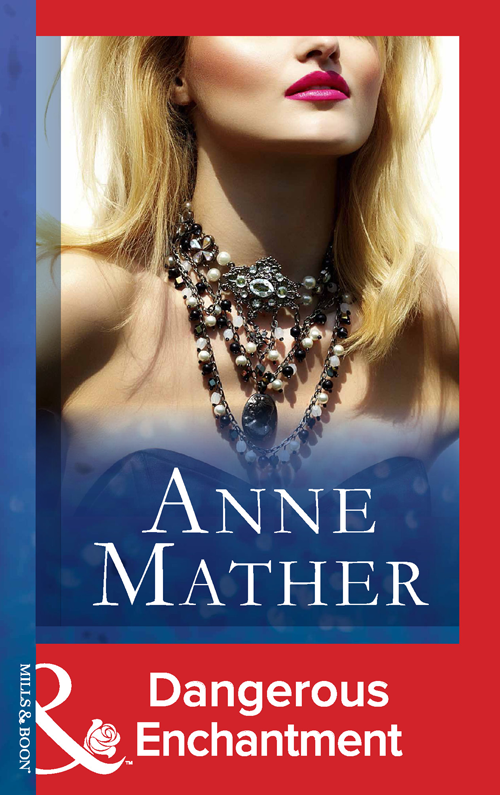
Mills & Boon is proud to present a fabulous collection of fantastic novels by bestselling, much loved author
ANNE MATHER
Anne has a stellar record of achievement within the
publishing industry, having written over one hundred
and sixty books, with worldwide sales of more than
forty-eight MILLION copies in multiple languages.
This amazing collection of classic stories offers a chance
for readers to recapture the pleasure Anne’s powerful,
passionate writing has given.
We are sure you will love them all!
I’ve always wanted to write—which is not to say I’ve always wanted to be a professional writer. On the contrary, for years I only wrote for my own pleasure and it wasn’t until my husband suggested sending one of my stories to a publisher that we put several publishers’ names into a hat and pulled one out. The rest, as they say, is history. And now, one hundred and sixty-two books later, I’m literally—excuse the pun—staggered by what’s happened.
I had written all through my infant and junior years and on into my teens, the stories changing from children’s adventures to torrid gypsy passions. My mother used to gather these manuscripts up from time to time, when my bedroom became too untidy, and dispose of them! In those days, I used not to finish any of the stories and Caroline, my first published novel, was the first I’d ever completed. I was newly married then and my daughter was just a baby, and it was quite a job juggling my household chores and scribbling away in exercise books every chance I got. Not very professional, as you can imagine, but that’s the way it was.
These days, I have a bit more time to devote to my work, but that first love of writing has never changed. I can’t imagine not having a current book on the typewriter—yes, it’s my husband who transcribes everything on to the computer. He’s my partner in both life and work and I depend on his good sense more than I care to admit.
We have two grown-up children, a son and a daughter, and two almost grown-up grandchildren, Abi and Ben. My e-mail address is mystic-am@msn.com and I’d be happy to hear from any of my wonderful readers.
Dangerous Enchantment
Anne Mather

MILLS & BOON
Before you start reading, why not sign up?
Thank you for downloading this Mills & Boon book. If you want to hear about exclusive discounts, special offers and competitions, sign up to our email newsletter today!
SIGN ME UP!
Or simply visit
signup.millsandboon.co.uk
Mills & Boon emails are completely free to receive and you can unsubscribe at any time via the link in any email we send you.
Table of Contents
Cover
About the Author
Title Page
CHAPTER ONE
CHAPTER TWO
CHAPTER THREE
CHAPTER FOUR
CHAPTER FIVE
CHAPTER SIX
CHAPTER SEVEN
CHAPTER EIGHT
CHAPTER NINE
CHAPTER TEN
CHAPTER ELEVEN
CHAPTER TWELVE
Copyright
CHAPTER ONE
JULIE studied her reflection critically in the mirror of her dressing table and gave a half-rueful smile. She was ready, and she hoped she would not let Paul down. Tonight was important to him, and she wanted to please him. Her dress, a simple cream cheesecloth, complemented her complexion. Her eyes, brown with tiny green lights in them, sparkled at the prospect of the evening ahead of her, and she cupped her chin on one hand as she wondered why tonight seemed so full of promise.
Her bedroom door opened after a light tap, and her mother came into the room. She smiled, appreciatively, and said:
“Are you nearly ready? Paul is waiting downstairs impatiently.”
Julie rose to her feet and turned round. “How do I look?”
Her mother studied her for a moment. “Very nice. But don’t you think you ought to have had a proper evening dress? Paul is wearing a dinner jacket, you know.”
Julie shrugged her slim shoulders, and the swathe of straight chestnut hair swung softly against her flushed cheeks.
“I’m sure this will be all right,” she said, shaking her head. “In any case, Mum, I haven’t a proper evening dress.”
“I know, darling, but maybe we ought to have tried to get you one.” Her mother looked anxious.
“Don’t be silly,” Julie smiled warmly at her mother. “Darling, it’s only a staff dance, and nowadays nobody wears formal clothes.”
Her mother sighed, sure that Julie was only saying that to spare her feelings. “Very well,” she said, sighing. “But I’m sure a smarter dress would be more suitable.” She sighed. “One thing is certain, though, Paul would think you looked nice in anything.”
Julie laughed, and hugged her mother, and then picked up the red velvet evening coat which was lying on the bed and preceded her mother down the stairs.
Paul Bannister was standing in the lounge, drinking a glass of sherry which Julie’s father had provided him with. In an evening suit he looked handsome, his fair good looks and tall slender build accentuated by the darkness of his clothes. Dr. Kennedy, Julie’s father, was sitting relaxed and comfortable in a deep armchair, smoking a cigar and discussing a recent case with Paul. Dr. Kennedy was a doctor with a general practice here in Kensington. Paul was attempting to look interested, but his eyes lit up as Julie entered the room, her coat about her shoulders.
Dr. Kennedy smiled, and rose to his feet. “Well, Julie,” he said warmly, “you’re a sight for sore eyes and no mistake. What do you think, Paul?”
Paul shook his head. “I think she looks marvellous,” he said, with all the fervency of youth, and Julie’s parents exchanged a knowing glance.
Julie, sensing the parental interest, seized Paul’s arm determinedly. “Come on,” she said, “let’s go.”
Paul drove a small Austin and he helped Julie inside before walking round the bonnet and sliding in beside her. Giving her a swift kiss, he said: “I know I’m going to be the most envied man there tonight.”
Julie chuckled. “Really! That’s not very modest.”
Paul stared at her uncomprehendingly for a moment, and then sighed.
“Oh, you’re mocking me again. You know what I mean!”
She laughed. “Oh, Paul, I must stop teasing you.”
She lay back in her seat as Paul threaded his way through the London traffic towards Earl’s Court. It was a little after seven-thirty and the roads teemed with cars. But Julie felt singularly content, and very lucky. Here she was, twenty-one years of age, and on her way to spend the evening with a handsome young man who was obviously in love with her. She had a secure and happy background, and what more could any girl ask for? If her own feelings for Paul were a little bit nebulous at the moment, they would change, and she had no doubts that in the fullness of time she and Paul would marry and get a house in one of the new developments in the suburbs, and eventually raise a family of their own.
Paul’s job was exciting, too. He worked for an independent television company, and although at the moment his work seemed to encompass a variety of duties, as he grew older and more experienced, he would very likely be able to gain a more palpable position. He was clever, if a little studious sometimes, and she had no doubt that his efforts would not go unrewarded. But money, to Julie, was unimportant compared to happiness. Her parents had never been well off, but she had never lacked for love and companionship, and these were the important things. Paul’s obsession with gaining a better job with more money was no doubt due to his desire to marry and settle down, and be able to provide a good home for his family, but Julie hoped that was all it was. She had attended a boarding school, despite the monetary difficulties and had witnessed plenty of heartbreak amongst girls with far more money than herself. Their parents, for example, had never attended open days, and when holidays came around they were sent off on cruises with only nannies to keep them company. Julie had appreciated the welcome she received from her parents, and their obvious delight in having her home again.
When she left school, she had decided to work in a large store in Oxford Street. She liked meeting people, and it was through her work she had met Samantha Edwards. Samantha was now her closest friend. She had come into the Cosmetics Department where Julie worked for make-up and perfume, and then discovered that she and Julie had attended the same school, although Samantha was a couple of years older, and the daughter of a merchant banker. Her parents were divorced, and Samantha herself was now married to an artist called Benedict Barlow.
Thinking about artists brought Julie back to tonight’s festivities. It was the annual staff dance at Phoenix Television, and naturally Paul had wanted to go. Julie was looking forward to it. As it was being held at the studios she was curious; she had never been inside a television studio before.
Phoenix Television stood in its own court off Warwick Road, and it did not take Paul long to drive there. Within the area gates was a huge car-park and it was here, among an assortment of cars large and small, that Paul left the Austin. It was a cold October evening, and Julie hugged Paul’s arm as they crossed to the welcoming lights of the huge building with Phoenix Television neon-lighted somewhere near the top.
Inside a doorman admitted them, checked their invitations, and then directed them to a lift which whisked them up to the twelfth floor.
“A whole floor has been given over to our largest studio,” said Paul, in explanation, “and it’s there they’re holding the dance. Plenty of room.”
Julie nodded. They were the only people in the lift, and she hoped they would not be the first to arrive. The invitation had said seven-thirty, but as the food was to be provided by a buffet, there was no deadline. She was just about to ask Paul whether it would perhaps be better if they delayed their arrival when the lift stopped with a jerk. They had reached the twelfth floor.
Music was the first thing Julie noticed. The band sounded wonderful and she shed her doubts about their early arrival and followed Paul along a corridor which was thronged with people. At the far end a huge hall awaited them, and despite Julie’s fears it was obviously well on the way to being crowded. Everyone was drinking and laughing and talking, and there was a welcoming air of camaraderie.
A friendly attendant showed Julie the way to the ladies’ powder room, where she could leave her coat and attend to her make-up. It, too, was crowded with women, all expensively garbed and jewelled. Diamonds flashed on ears and throats and fingers, and Julie fingered her silver bracelet, which was her only adornment, tentatively. She owned very little jewellery, and had not thought to ask her mother to lend her a necklace. Shrugging her slim shoulders, she made her way to the door again. It was no use worrying now; she must just hope she looked all right as she was.
Back along the corridor Paul was waiting for her impatiently, but he was not alone. With him were another young couple whom he introduced as Larry and Jane Chandler. “Larry works here, too,” he explained to Julie. “He and Jane have only been married three weeks.”
“Have you? How marvellous,” exclaimed Julie enthusiastically.
Jane smiled. She was a pretty redhead, with an engagingly piquant face. “Yes, Julie. And now we’re going round all our friends recommending it.” She glanced archly at Paul. “Haven’t you thought of taking the plunge yet, Paul?”
Paul smiled. “Several times.” He looked at Julie. “Especially during the last few months.”
Julie flushed and changed the subject. For all her gentle imaginings earlier in the evening, she was not quite ready yet to forsake her freedom and settle down to married life with Paul. Always, when it came down to it she felt a strange cautioning feeling deep inside her, as though she were not quite sure yet of her feelings for him. Maybe she was expecting too much, she thought. After all, she was very fond of Paul, and knew he would make a marvellous husband. He was considerate and kind, and liked children. But somehow she was afraid.
At the far end of the hall, spread out on several long tables which seemed to be groaning under the weight, was the buffet. There was every kind of food imaginable, from lobster paté and caviare to meat balls in savoury mushroom gravy, served in deep little bowls with wooden spoons.
There was plenty to drink, too, and as it was provided free by the company, there was no shortage of takers. Staying with the Chandlers, Julie and Paul found a vacant table near the dance floor, and ordered Martinis from a white-clad attendant.
The band was accommodated on a dais at the opposite end of the hall from the buffet, and tables had been set all along the side of the floor. Adjoining this hall, was a smaller area, screened off and available for anyone who wished for a little more privacy. Discreet lighting made the cavernous studio into an Aladdin’s cave, and the brightly coloured dresses and sparkling jewels added an air of festivity.
Paul smiled round. “We’ve made quite a good turnout, haven’t we?” he said, and Larry grinned, as though amused by Paul’s identification of himself with the company.
The girls talked about clothes, and the latest Robert Redford film, and later Paul took Julie to meet a couple of producers and their wives with whom he had worked, and Julie felt a little disturbed by Paul’s obvious pride in herself. They returned to Larry and Jane, and as quite a lot of people were dancing now, Larry asked Julie whether she would dance with him.
Julie agreed, and Paul followed suit and asked Jane. Afterwards they exchanged partners regularly, and made the evening more enjoyable. Larry and Paul were both good dancers, and between dances the girls talked together and listened to the boys talking shop.
Jane grimaced, and said: “Have you noticed how people in television think there’s no other kind of existence?” she laughed. “Be warned, Julie. If you marry Paul, you’ll have to suffer this kind of thing every time you meet a colleague. Can you stand it?”
Julie flushed. “I don’t know. Is it to be recommended?”
“Well, that depends on the man.” Jane frowned, and leaned towards her. “I think Paul is an awfully nice boy.”
“Yes, so do I,” murmured Julie slowly, wishing she felt more certain of herself, and her feelings.
Once while she was dancing with Larry, he said: “Old Paul certainly knows how to pick them. When are you going to get hitched?”
Julie had to smile. “It’s not definite yet,” she prevaricated. “Tell me, what do you do here? Are you on the production or presentation side?”
“I’m assistant to the producer’s right-hand man,” he replied, chuckling. “Sort of dogsbody’s dogsbody.”
Julie laughed, too. “Still, I suppose you meet all sorts of exciting people, don’t you? There are always heaps of stars appearing.”
“I meet some of them,” admitted Larry, nodding. “But my work doesn’t encompass all the studios, and naturally there are people coming and going who I never get to see.”
The evening wore on. They had supper together, and several other couples stopped to chat for a while and then drifted on. It was a friendly affair, and there was no consciousness of boss and employee.
Jane and Larry left them for a while as Larry wanted to introduce his wife to his immediate superior, and Paul got himself and Julie another drink.
“Enjoying yourself?” he asked, offering her a cigarette.
Taking it, she nodded. “Very much. Are you?”
“Yes, I am rather. Larry and Jane are a nice couple. I’m glad we palled up with them.”
Julie smiled. “Where is your boss, anyway, Paul? You know, Mr. Parrish, the one you’re always quoting to me.”
Paul smiled now. “Don’t be facetious. Actually, he never comes to these affairs. Someone has to keep things ticking over while this jamboree is going on, and Mr. Parrish does just that thing. You realize there are programmes being transmitted this evening, don’t you?”
“Of course. I never thought of it.” Julie drew on her cigarette thoughtfully. “It always seems so exciting, television. I mean, there’s never a dull moment. At any time you might meet your favourite film star, or some comedian or singer you admire. I think I should like to work in television myself.”
Paul grinned. “Apply for a position. They can only refuse you.”
Julie shook her head. “No, I’m not all that keen, I don’t think. And anyway, I like my work at the store. If I changed at all, it would be to something entirely different; like nursing, or looking after children, or something like that. Sometimes I wish I’d become a nanny. I should like to take care of some of these children whose parents don’t give a damn about them except to see that they’re fed and watered, and dressed in pretty clothes.”
“Marry me, and we can raise a family of our own.” Paul’s face was earnest, and Julie was sorry she had invited this.
“Give me time, Paul,” she pleaded. “Look, who’s that who has just come in? It looks like … it is! Manuel Cortez. Oh, Paul, I love his music. You didn’t tell me he was doing a programme for Phoenix!”
Paul had risen to his feet, his face flushed. “That’s Mr. Parrish with him,” he said, in a voice that sounded slightly awed. “Good heavens! I never thought to see him come here.”
Julie rose also, glancing strangely at Paul. “Why do you suppose he has come?”
“To show our distinguished visitor around, I suppose. How the staff of Phoenix Television take their leisure.” His voice sounded normal again. “I forgot about Manuel Cortez’ programme, though. I know you’re a fan of his. Attractive man, isn’t he?”
Julie nodded. “Very. He probably knows it, too. A man in his position couldn’t fail to be aware of his assets.”
Paul shrugged. “Come on, let’s get a drink. Mr. Parrish won’t have any time for me tonight.”
But in this he was wrong. As they passed the arched entrance on their way to the buffet, Neil Parrish hailed his young assistant jovially, as though he too had been imbibing rather freely.
“Well, Paul, enjoying yourself?”
Paul’s expression became annoyingly subservient, and he smiled ingratiatingly. “Very much, thank you, Mr. Parrish. Are you joining us?”
“Afraid not.” Neil Parrish glanced at his companion. “You know Señor Cortez, don’t you, Paul?”
“Yes. Good evening, señor. Have you finished the show now?”
Manuel Cortez nodded, his eys on Julie, and Julie, conscious of his scrutiny, returned his gaze coolly. She was used to the bold glances men cast in her direction. But Manuel Cortez was not quite like them, she had to concede. To begin with, he was a very attractive man, tall and lean, his dark face dominated by tawny tiger’s eyes which were enigmatic in his appraisal. His dark hair curled down to his collar and sideburns, which Julie had personally always abhorred, darkened his already swarthy complexion. He was dressed in a dark lounge suit and when he moved he had a sinuous feline grace which was purely sensual in its appeal. His mouth, too, was rather sensual, and Julie felt a kind of breathless suffocated sensation, as his eyes met hers, causing her to drop her lids defensively.
Linking her fingers tightly together, she became aware that Paul was still talking to Neil Parrish about something, and a moment later she was drawn forward and introduced first to Parrish himself, an elderly man with greying hair, and then to Manuel Cortez.
When Manuel Cortez spoke, his voice with its American accent tinged with Spanish was soft and husky, and Julie’s stomach was now behaving very peculiarly.
“How do you do, Miss Kennedy,” he said lazily, and she felt his cool hard fingers curve for a moment about hers.
“Tell me,” said Julie, casting about in her mind for something to say, “I’ve always been curious, are you Mexican or Cuban?”
Paul looked at her aghast, but Manuel Cortez did not seem to mind.
“Mexican,” he replied smoothly. “But my home is in California.”
“I see.” Julie nodded, and felt rather stupid. After all, what was it to her where he lived? But she had always admired him, and his records were very popular over here as well as in the States. He could play practically any instrument, and often sang with a guitar, the kind of sad, Indian-type songs that went down so well. Julie knew little about him except these facts and the obvious one of his being rather too expensive to appear on British television very often. She had seem him as a guest on various American shows which were shown in this country, and she had bought some of his records because they were good to listen and dance to. She imagined he must be about thirty-five, though there were lines on his face she could see now which did not appear on the television screen. But they did not detract from his attraction but rather added to it.
Paul asked Neil Parrish whether he would stay and have a drink, but Parrish shook his head, and then they were joined by some of the bigger fry of Phoenix Television, who had just noticed that Parrish was there, and who was with him. Parrish protested volubly that he had not time to stay and that Manuel Cortez was just leaving, but in the general chatter it was difficult for them to leave. Paul and Julie, who now seemed superfluous, drew back to the buffet tables and Paul said:
“Isn’t it sickening? One can’t have a private conversation without being invaded by the mob!”
Julie smiled, but she glanced back a little regretfully to the group. For some reason she felt rather depressed suddenly. It had been an exciting interlude talking to Neil Parrish, and Manuel Cortez was such a personality. She sighed.
“I suppose everyone wants to meet Manuel Cortez,” she said reflectively. “After all, it’s not every day he’s around.” She smiled up at Paul. “Darling, don’t be such a misery! You said we weren’t very important, remember?”
“I never said that.”
“Oh, no,” she laughed, “it was Larry. He said he was a dogsbody’s dogsbody.”
“Did he?” Paul was aloof. “Well, I’m afraid I take my work a little more seriously than that, Julie.”
“Paul, don’t be silly,” Julie shrugged her slim shoulders. “Shall we dance?”
“I’m hungry,” said Paul bluntly. “I don’t want to dance just now.”
Julie gave a helpless movement of her shoulders. In this mood Paul was impossible. Somehow she had aroused his indignation; she wondered why he was so touchy about his work. Maybe he tried too hard.
She forced herself to eat a few canapés, but the music was infectious and as the younger members of the guests had monopolized the floor now with their weird dances the music grew more and more exciting.
Sipping a glass of champagne a few minutes later, they were joined by of all people Neil Parrish. Paul brightened immediately, but Parrish did not seem to be in the best of tempers.
“Bannister! Can you go down to the reception and ask Mr. Cortez’ chauffeur to wait in the downstairs lounge? It seems that Mr. Cortez will not be joining him as soon as we expected.”
Julie wondered why Parrish didn’t just use the telephone himself, but Paul did not seem to see anything unusual in the request.
“Of course, Mr. Parrish,” he said. “Excuse me, Julie. I won’t be long.”


